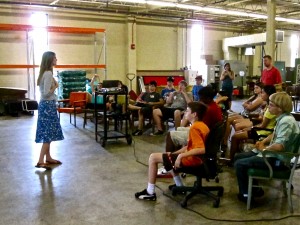 VAMPY students have recently had multiple opportunities to learn about Western Kentucky University’s commitment to sustainability. Christian Ryan-Downing, Campus Sustainability Coordinator, was our host for the WKU Green Tour. Reusing abandoned bicycles in the Big Red Bike program, watering plants using stored rainwater, and experimenting with highly reflective asphalt coatings (to reduce “heat island effect”) are examples of intentional efforts to reduce the university’s environmental footprint. Architectural and landscaping choices are also made with sustainability in mind. The new Gary A. Ransdell Hall meets the Leadership in Energy and Environmental Design (LEED) Gold standard. WKU is one of seven schools in the state to earn the Tree Campus USA designation from the Arbor Day Foundation. The Central Heating Plant recently converted its boilers from coal to natural gas; LED lighting has reduced electricity consumption in the Parking Structure by 54 percent, and the Preston Activities Center boasts a rooftop solar array to heat its indoor swimming pool. Christian explained that university president Dr. Gary Ransdell is a tremendous supporter of these green initiatives, and the rule of thumb is that individual improvements should pay for themselves within ten years.
VAMPY students have recently had multiple opportunities to learn about Western Kentucky University’s commitment to sustainability. Christian Ryan-Downing, Campus Sustainability Coordinator, was our host for the WKU Green Tour. Reusing abandoned bicycles in the Big Red Bike program, watering plants using stored rainwater, and experimenting with highly reflective asphalt coatings (to reduce “heat island effect”) are examples of intentional efforts to reduce the university’s environmental footprint. Architectural and landscaping choices are also made with sustainability in mind. The new Gary A. Ransdell Hall meets the Leadership in Energy and Environmental Design (LEED) Gold standard. WKU is one of seven schools in the state to earn the Tree Campus USA designation from the Arbor Day Foundation. The Central Heating Plant recently converted its boilers from coal to natural gas; LED lighting has reduced electricity consumption in the Parking Structure by 54 percent, and the Preston Activities Center boasts a rooftop solar array to heat its indoor swimming pool. Christian explained that university president Dr. Gary Ransdell is a tremendous supporter of these green initiatives, and the rule of thumb is that individual improvements should pay for themselves within ten years.
Sara Hutchison, Recycling and Surplus Coordinator, helped students better understand the university’s decision to promote recycling, both on campus and in the community. Aside from the environmental benefits of sustainable choices, there are economic benefits, as well. In fact, the university earns little revenue from recycling 14 percent of its solid waste (a number that Hutchison is committed to increasing through a new “single stream” system, which will simplify the recycling process for students and faculty). However, each pound that is diverted from the landfill represents measurable savings for WKU. In addition to recycling, Hutchison and her staff facilitate the reuse of unwanted furniture, filing cabinets, and classroom supplies. Academic departments can save money by furnishing their offices with pre-owned items. IT students even refurbish old computers and donate them to area non-profits.
Students commented specifically on the community effort required to make these programs successful. The vision for a sustainable future must be communicated clearly across the campus, and everyone must be willing to re-examine institutionalized practices. This reinforces a key principle we have been learning in class: sustainability involves the relationship between society, economy, and environment. It is very encouraging to see WKU leading the way in its commitment to sustainability!
